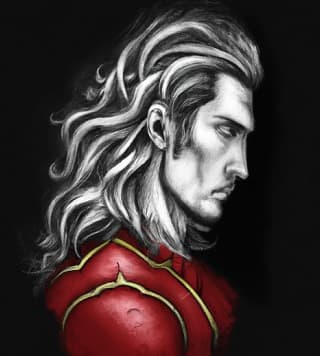Hjúki - God of Norse Mythology

Hjúki, a figure from Norse mythology often associated with the moon god Máni.
Hjúki (pronounced: "yoo-kee") is a figure in Norse mythology who, along with his sister Bil, accompanies the Moon deity Máni as he travels across the sky. The exact nature and origin of Hjúki and Bil remain uncertain, but they are mentioned in several Old Norse sources, including the Prose Edda and the Poetic Edda.
The name "Hjúki" in Old Norse runes is written as:
ᚼᛁᚢᚴᛁ
According to the Gylfaginning, a section of the Prose Edda, Hjúki and Bil were the children of a being named Viðfinnr. As they were carrying a vessel of water back to their father from the Byrgir well, Máni took them up into the sky, and they have been associated with the Moon ever since.
The name "Hjúki" may be derived from the Old Norse word for "to hitch" or "to take along." Some scholars have suggested that Hjúki and Bil may represent personifications of the tides or lunar craters, while others have speculated that they could be related to the Germanic tradition of the Wild Hunt.
Despite the uncertainty surrounding Hjúki and Bil, their story has had an enduring influence on popular culture. The English nursery rhyme "Jack and Jill" has been linked to the legend of the two Norse children, and the names Hjúki and Bil have been used in various works of literature, music, and art over the years.
Please note that the information provided about Hjúki and Norse mythology is complex and may be subject to interpretation and debate. The myths and stories of Norse mythology have evolved and been passed down through oral tradition and written accounts, and there may be variations in the way they are told and understood. This information should be used as a general reference and not as a definitive source on the subject.
If you notice an error on this web page, please email us at contact@historylists.org and let us know about it. Please be sure to include a brief description of the mistake you have noticed, along with the location of the mistake on the web page (e.g., the specific section or paragraph where it appears). We appreciate your help in keeping our website accurate and will use the information you provide to make necessary updates as soon as possible. Thank you for your assistance!
Other Norse Gods and Goddesses
- Baldr (Æsir) - God of Light, Beauty, and Goodness.
- Beyla (Ásynjur) - Goddess of Agriculture.
- Bil (Ásynjur) - Associated with the Moon.
- Borr (Æsir) - Father of the Norse Gods.
- Bragi (Æsir) - God of Poetry and Song.
- Byggvir (Vanir) - God of Agriculture.
- Dagr (Æsir) - God of Day.
- Dellingr (Æsir) - God of the Dawn.
- Eir (Ásynjur) - Goddess of Healing and Protector.
- Fjörgyn (Ásynjur) - Goddess of the Earth.
- Fjörgynn (Æsir) - God Associated with the Heavens.
- Forseti (Æsir) - God of Justice and Reconciliation.
- Freyja (Vanir) - God of Love, Fertility, War, and death.
- Freyr (Vanir) - God of Fertility and Prosperity.
- Frigg (Ásynjur) - Queen of the Gods.
- Fulla (Ásynjur) - Goddess of Fertility.
- Gefjon (Ásynjur) - Goddess of Fertility.
- Gerðr (Ásynjur) - Goddess of the Earth.
- Gersemi (Vanir) - Goddess of Precious Objects.
- Gná (Ásynjur) - Messenger of the Gods.
- Gullveig (Vanir) - Goddess of Witchcraft and Sorcery.
- Heimdall (Æsir) - Watchman of the Gods.
- Hel (Æsir) - Goddess of the Underworld.
- Hermóðr (Æsir) - Messenger of the Gods.
- Hjúki (Æsir) - Associated with the Moon.
- Hlín (Ásynjur) - Goddess of Protection.
- Hnoss (Vanir) - Goddess of Beauty and Treasure.
- Höðr (Æsir) - God of Darkness.
- Hœnir (Æsir) - God of Creation.
- Iðunn (Ásynjur) - Goddess of Immortality.
- Ilmr (Ásynjur) - Ancient and Little-Known Deity.
- Irpa (Ásynjur) - Ancient and Little-Known Deity.
- Ítreksjóð (Æsir) - Son of Odin.
- Jörð (Ásynjur) - Goddess of the Earth.
- Kvasir (Vanir) - God of Wisdom.
- Lóðurr (Æsir) - God of Creation.
- Lofn (Ásynjur) - Goddess of Love.
- Loki (Æsir) - God of Mischief and Deception.
- Magni (Æsir) - God of Strength.
- Máni (Æsir) - God of the Moon.
- Meili (Æsir) - God of Travel.
- Móði (Æsir) - God of Courage.
- Mimir (Æsir) - God of Wisdom.
- Nanna (Ásynjur) - Goddess of Love and Devotion.
- Njörðr (Vanir) - God of the Sea and Fertility.
- Njörun (Vanir) - Goddess of the Earth.
- Nótt (Æsir) - Goddess of the Night and Dreams.
- Odin (Æsir) - God of Creation and King of the Gods.
- Óðr (Vanir) - God of Divine Madness, Poetry, and Long Journeys.
- Rán (Ásynjur) - Goddess of the Sea and Death.
- Rindr (Ásynjur) - Goddess Associated with Vengeance.
- Sága (Ásynjur) - Goddess of Wisdom.
- Sif (Ásynjur) - Goddess of Abundance.
- Sigyn (Ásynjur) - Goddess of Loyalty.
- Sjöfn (Ásynjur) - Goddess of Love.
- Skaði (Ásynjur) - Goddess of Hunting, Skiing, and Winter.
- Snotra (Ásynjur) - Goddess of Wisdom.
- Sól (Ásynjur) - Goddess of the Sun.
- Syn (Ásynjur) - Goddess of Vigilance, Guardianship, and Defense.
- Þorgerðr Hölgabrúðr (Ásynjur) - Goddess Associated with Protection.
- Thor (Æsir) - God of Lightning and Protection.
- Þrúðr (Ásynjur) - Goddess of Might and Strength.
- Týr (Æsir) - God of War and Justice.
- Ullr (Æsir) - God of Skiing, Archery, and the Hunt.
- Váli (Æsir) - God of Revenge.
- Vár (Ásynjur) - Goddess of Oaths and Agreements.
- Vé (Æsir) - God of Creation.
- Víðarr (Æsir) - God of Vengeance.
- Vili (Æsir) - God of Creation.
- Vör (Ásynjur) - Goddess of Wisdom and Vigilance.